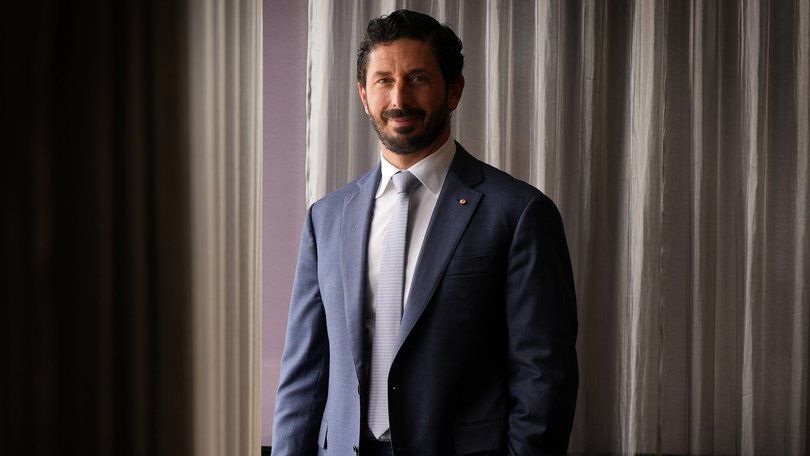Seven Group Holdings’ profit jumps 30pc to $850m as Boral, WesTrac, Coates enjoy strong demand

Industrials conglomerate Seven Group Holdings plans to turbocharge growth for Boral now that it fully owns the construction materials maker, expecting a national $1.7 trillion infrastructure pipeline to underpin demand.
Seven Group on Wednesday reported a pre-tax earnings jump of 20 per cent in the 2024 financial year, driven predominantly by strong results for its industrial services businesses.
Chief executive Ryan Stokes said infrastructure projects were key productivity drivers and higher spending had “been a long time coming”.
Sign up to The Nightly's newsletters.
Get the first look at the digital newspaper, curated daily stories and breaking headlines delivered to your inbox.
By continuing you agree to our Terms and Privacy Policy.“The benefits are underestimated, and what they do to support the . . . strength of our economy, and given most infrastructure spend is occurring in metropolitan areas just weighted for population growth, it’s pretty essential,” Mr Stokes told The West Australian.
Seven Group — which encompasses Boral, equipment hire firm Coates, and mining and industrial machinery company WesTrac — reported pre-tax earnings of almost $1.42b, while revenue was up 10 per cent to $10.6b and post-tax profit jumped 30 per cent to $850 million. Seven Group also has a 39.8 per cent stake in Seven West Media, publisher of this website.
Mr Stokes said an infrastructure pipeline in the order of $1.7t over the next seven years was a sign of confidence in the Australian economy across the board.
“It is also probably one of the clear forms of productivity gains when you look at what infrastructure can do — it’s got a lot of benefits,” he said.
“So I think those elements are probably not as appreciated, and I generally don’t think it’s a fundamental constraint to the point where it would be purely a form of inflation. I think fundamentally it’s keeping things actively moving along.
“But now we’ve gone through record population growth, and that infrastructure is all critical, and arguably probably not going to keep up with the population growth.”
Industrial services was the company’s clear hero for the year, capped by finalising the $5.2b deal to fully acquire Boral, which was finalised early last month. Customer demand for the building materials company was strongest from the non-residential sector, while residential market sales slipped slightly.
Mr Stokes expects growth to continue for Boral over the medium-term, with Seven Group exploring opportunities for its growth in property and recycling. The “breadth of opportunity” inherent in the company beyond its core offering was strong, he added.
“(It’s) construction, demolition waste predominantly, as well as the surplus properties which historically Boral would look to divest, where we see opportunity to hold and co-develop those opportunities over time,” Mr Stokes said.
“Our focus has always been to get the core business to perform to is potential and then these other areas will present growth opportunities on top of that.”
WesTrac, which focuses on CAT equipment, had enjoyed demand from customers extending and replacing fleets, bolstered by heightened activity in mining and industrials.
“We’ve seen most commodities go through investment, and while there’s a disruption in certain aspects around nickel, fundamentally the strength of all the other commodities across WA and NSW have presented a pretty compelling opportunity for WesTrac,” Mr Stokes said.
Elsewhere, Seven West Media had experienced “a pretty dramatic period of change” which was important, Mr Stokes said, but was building a more agile media business that could better capture digital revenue opportunities.
“If you look at the stability of The West (Australian), the publishing aspect and what we’ve been able to do . . . there’s a compelling opportunity and growing properties like The Nightly are still growth avenues,” he said.
Seven West’s new chief executive, Jeff Howard, and an internal reorganisation had been part of “quite a big shift, I think an important one” at the media business.
Mr Stokes said the company today had a team that would build a “strong and financially successful media company and build a pretty unified culture — certainly one that’s safe and doesn’t tolerate bad behaviour and ultimately is about building a performance culture”.
Seven Group, founded in 2010, also reported a compound annual growth rate of 18 per cent over the past decade — an achievement Mr Stokes said was emblematic of a strong performance across the group.
“It reinforces the performance is not just a one-off,” he said.
“We’ve consciously evolved the group towards core thematics so we can evolve and change.”
Chief financial officer Richard Richards said decisions to strategically pivot the business had paid off, and the “exceptional strength” of Seven Group’s franchise businesses supported robust results.
“I think, in fact, if markets are a bit more choppy in the next 12 months, that in the last 10 years has ultimately represented great opportunities for us to grow, and we’ve got a balance sheet ... and a capital structure that allows us to do that,” he said.
Originally published as Seven Group Holdings’ profit jumps 30pc to $850m as Boral, WesTrac, Coates enjoy strong demand
